Key takeaways:
- Wealth distribution impacts daily lives and opportunities, reflecting deeper systemic issues, including education and access to resources.
- Reparations, rooted in historical injustices such as slavery, are vital for addressing wealth disparity and acknowledging past grievances.
- Wealth inequality leads to social issues, affecting education and healthcare access, challenging the fairness of a system based on socioeconomic status.
- Actions promoting fair distribution include educational programs, advocating for living wages, and supporting cooperative business models to foster community wealth.
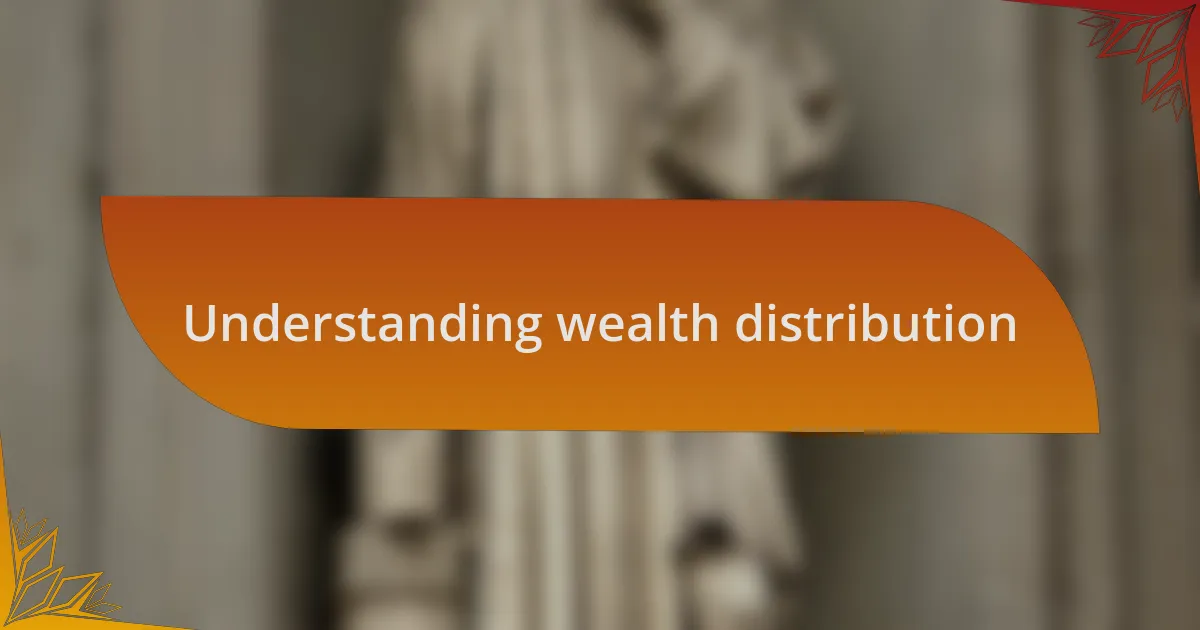
Understanding wealth distribution
Wealth distribution refers to how assets are spread among individuals or groups in society. When I first delved into this topic, I was struck by the stark disparities I found; wealth isn’t just about money, but rather about opportunities and access to resources. It makes you wonder — how do these unequal distributions impact our daily lives and our future?
In my exploration, I learned that systemic factors such as education, environment, and policies play significant roles in shaping wealth distribution. I remember meeting someone who had worked tirelessly from a young age but still struggled to make ends meet, while others inherited wealth without lifting a finger. It’s heartbreaking to see such inequities, prompting me to reflect on how our systems can perpetuate or challenge these disparities.
Understanding wealth distribution requires a lens focused on both statistics and human stories. For instance, consider how different neighborhoods can provide varied access to essential services based on wealth. The emotional weight of seeing children grow up in vastly different circumstances because of where they live is profound and makes me question the fairness of our economic structures. It’s a conversation that goes beyond numbers; it’s about dignity, opportunity, and justice.
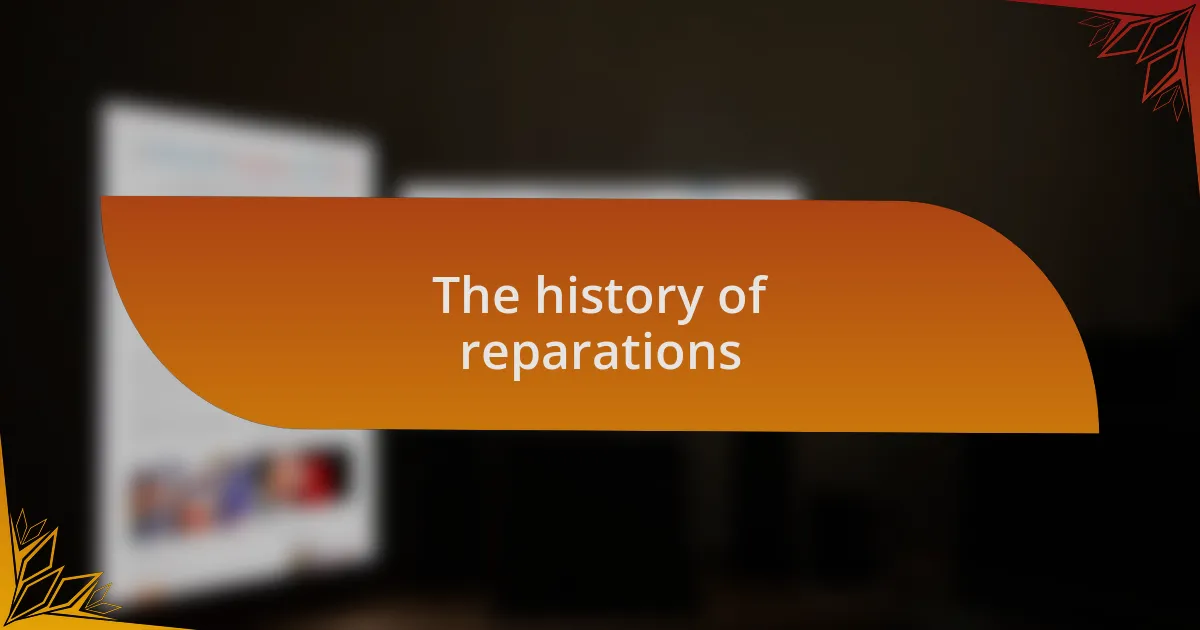
The history of reparations
Reparations have a complex history that traces back to the aftermath of slavery. In the United States, discussions surrounding reparations gained traction after the Civil War, particularly with the promise of “40 acres and a mule.” This notion aimed to compensate formerly enslaved people for their labor and lost opportunities. However, the promise was systematically broken, leaving many to wonder about the long-lasting effects of unfulfilled reparative justice.
Over the decades, various groups have advocated for reparations, highlighting issues of wealth disparity and systemic racism. I recall attending a community meeting focused on reparative policies where a speaker passionately recounted stories of families whose generational wealth was stripped away due to discriminatory laws. Listening to these narratives made me ponder: how can society move forward without addressing the injustices of the past? The emotional weight behind these calls for reparations brings to light the importance of acknowledging historical grievances as a pathway to healing and equity.
Globally, the conversation around reparations has taken root in multiple contexts, such as the reparations sought by victims of colonialism and those affected by war. In my readings, I discovered the compelling case made by nations and communities pushing for either financial compensation or symbolic gestures of acknowledgment. It raises a crucial question: can we truly rectify historical wrongs with monetary compensation, or do we need a more comprehensive approach to restitution? The answers often lie in the stories of those impacted, inviting us to listen and engage deeply with history’s unresolved wounds.
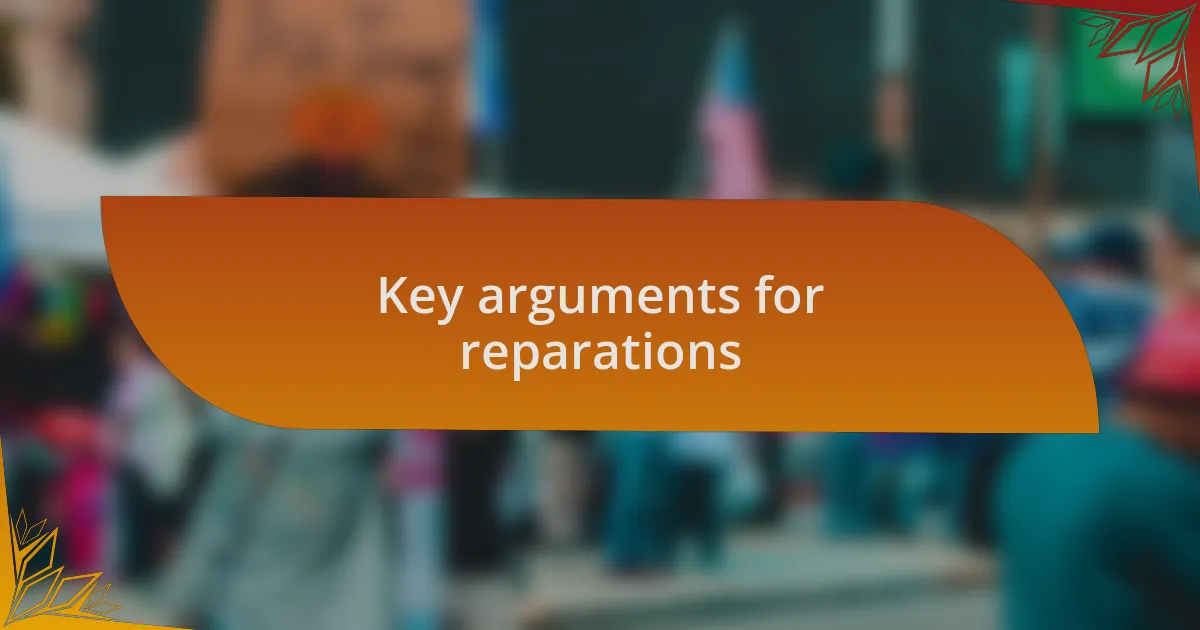
Key arguments for reparations
There are several compelling arguments for reparations, beginning with the undeniable economic disparities that exist today as a direct result of historical injustices. I often think about the wealth gap that has persisted across generations; it’s staggering how policies like redlining have systematically denied opportunities to entire communities. When I reflect on this disparity, I wonder: how can we expect marginalized groups to thrive when the foundations of wealth were built on their exclusion?
Another key argument centers on the moral responsibility we have to acknowledge and address the past. In conversations with friends, I’ve shared my frustration about how easily society forgets the potential of reparations as a means of restoring dignity. The emotional toll borne by those whose ancestors suffered from systemic oppression is still felt today. It raises an important question: can true reconciliation occur without addressing these historical wrongs?
Lastly, reparations can serve as a catalyst for broader social healing. I vividly recall hearing a poignant story from a descendant of enslaved people who expressed that financial reparations, while essential, must be accompanied by genuine recognition and dialogue about past injustices. It’s an important reminder that reparative actions shouldn’t only focus on monetary compensation but also on fostering a deeper understanding and commitment to equity for all.
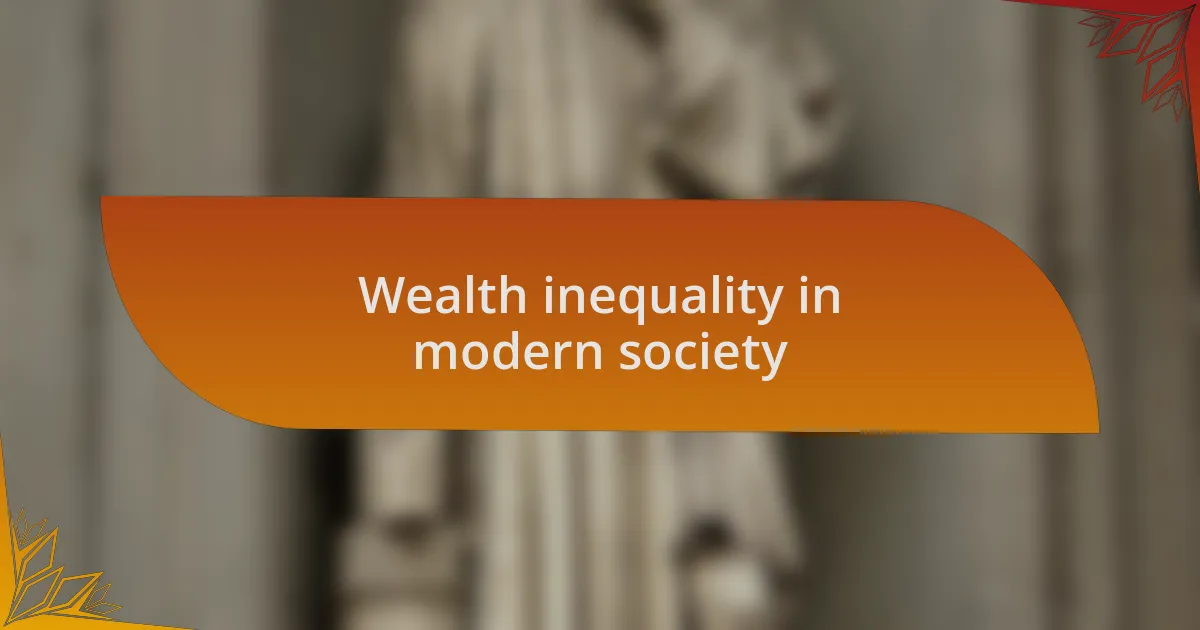
Wealth inequality in modern society
Wealth inequality in modern society is profoundly evident in the staggering statistics that illustrate the gap between the richest and the rest. When I look at the data, it often strikes me how a small percentage of individuals controls an overwhelming portion of wealth, leaving many struggling to make ends meet. How can we justify a system that allows for such disparity, especially when countless people work hard yet remain stuck in a cycle of poverty?
From my personal observations, it’s clear that this inequality breeds a multitude of social issues, including inadequate access to education and healthcare. I often hear stories of friends who, despite their relentless dedication, face barriers simply because of their socioeconomic status. It makes me ponder: what kind of society are we creating if success is determined more by one’s zip code than by merit?
Moreover, the impact of wealth inequality isn’t just statistical; it’s deeply personal. I vividly remember a conversation with a coworker who shared her struggles to save for her children’s future while juggling multiple jobs. Hearing her story made me realize that these disparities aren’t just numbers—they represent real lives filled with dreams and aspirations stifled by an uneven playing field. This brings me to reflect: what steps can we take to address these inequalities and create a more equitable future for everyone?
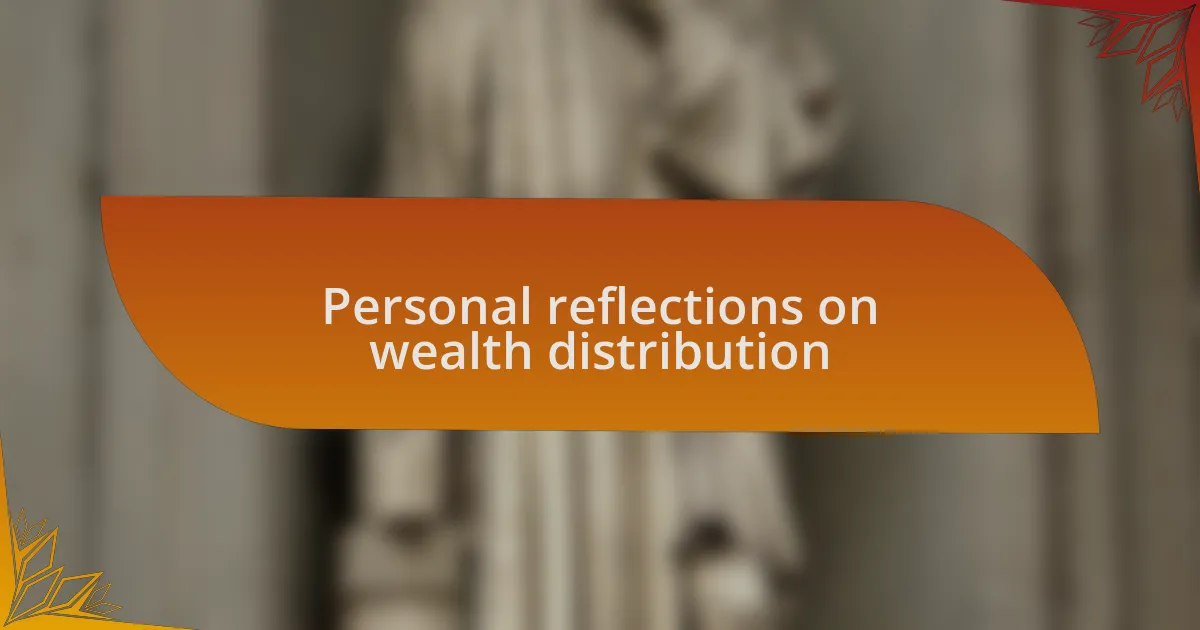
Personal reflections on wealth distribution
When I think about wealth distribution, I can’t help but recall a family gathering where I learned about my uncle’s experiences working three jobs to support his family. His story of constant hustle touched me deeply, yet it also filled me with frustration. I often wonder, why is it that despite his tireless efforts, he struggles while others accumulate vast wealth with far less effort? It just seems so unjust.
One other moment that stands out to me was when I volunteered at a local food bank. I met individuals who had lost their jobs due to unforeseen circumstances but were too proud to ask for help. They reminded me that wealth distribution isn’t merely about numbers; it’s about human dignity. Shouldn’t we strive to create systems that prevent such vulnerabilities?
Reflecting on these experiences, I feel a growing sense of urgency to address wealth disparities. I find myself questioning what kind of legacy we are leaving for future generations. If we do not act now to bridge this gap, are we not failing those who come after us?
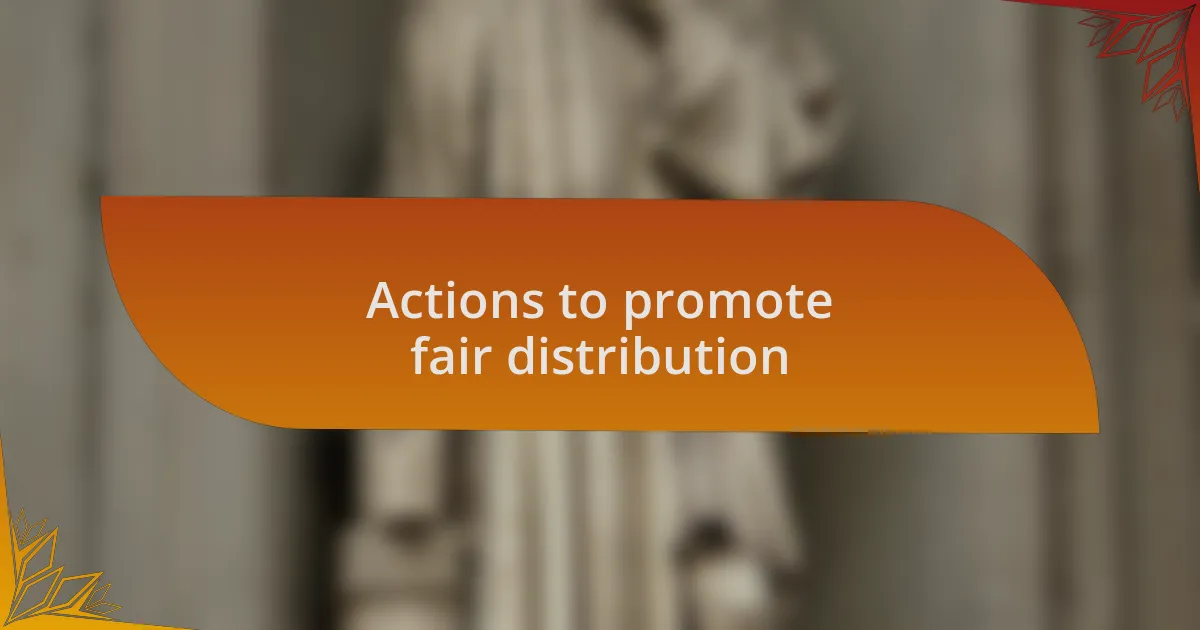
Actions to promote fair distribution
One compelling action to promote fair distribution is creating educational programs that empower marginalized communities. I remember attending a workshop aimed at financial literacy for young adults from low-income backgrounds. The transformation in their confidence and understanding of money management was palpable. Can you imagine what it would mean for them to break the cycle of poverty simply by learning how to handle their finances?
Another effective strategy is advocating for policy changes that ensure a living wage. I once participated in a campaign where we gathered stories from workers who were struggling to make ends meet despite working full time. Hearing their voices made it clear: we need to support legislation that guarantees fair pay. Shouldn’t everyone deserve to earn enough to live with dignity?
Lastly, promoting cooperative business models can create shared wealth within communities. I’ve seen firsthand how local co-ops not only provide jobs but also foster a sense of ownership among members. When people feel invested, they collaborate to elevate each other. Isn’t it time we prioritize models that benefit everyone over a select few?
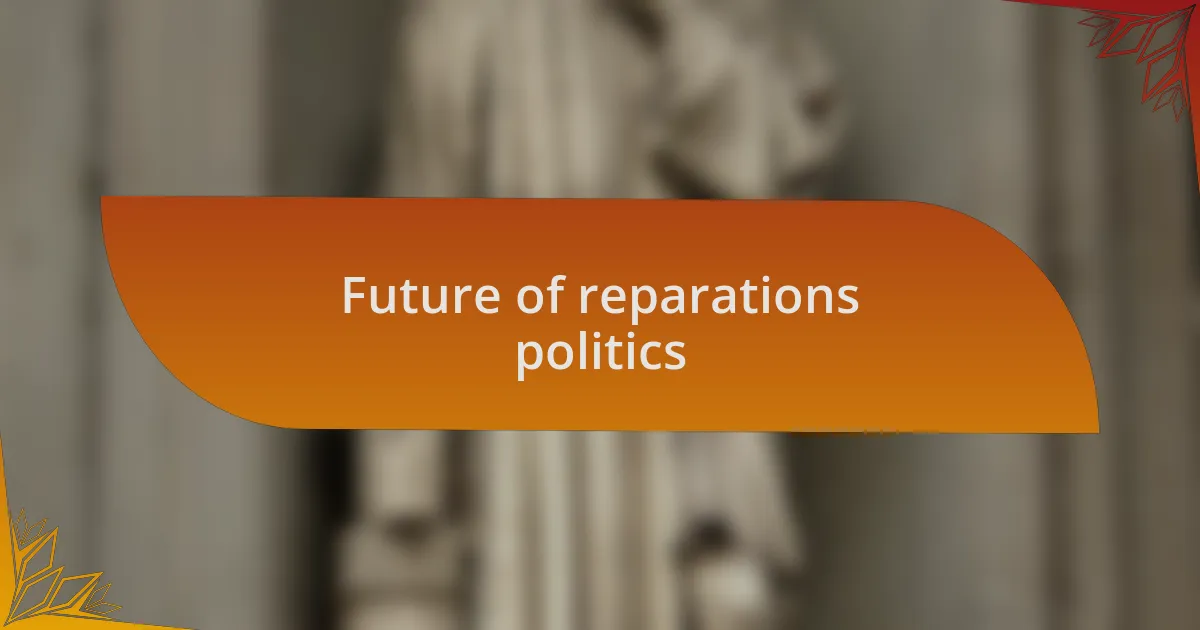
Future of reparations politics
As we look to the future of reparations politics, I suspect we’ll see an increase in grassroots movements advocating for change. During a community meeting I attended, an activist shared stories of generational trauma and the urgent need for reparative action. It struck me then just how vital it is for these voices to be amplified in policy discussions—without their input, how can we hope to create meaningful solutions?
The conversation around reparations is also evolving to include the economic benefits of addressing wealth disparities. I’ve often found that when people understand the broader implications—such as increased economic growth and stability—they become more receptive to the idea. Does acknowledging historical injustices not serve the greater good, paving the way for a more equitable society?
Lastly, the role of technology cannot be overlooked in the future of reparations. I recall a discussion about how digital platforms can help distribute financial resources directly to those historically disadvantaged. The thought of using innovative tools to create transparency and accountability in reparations efforts excites me. Isn’t it fascinating how we can leverage these advancements to redefine justice for all?